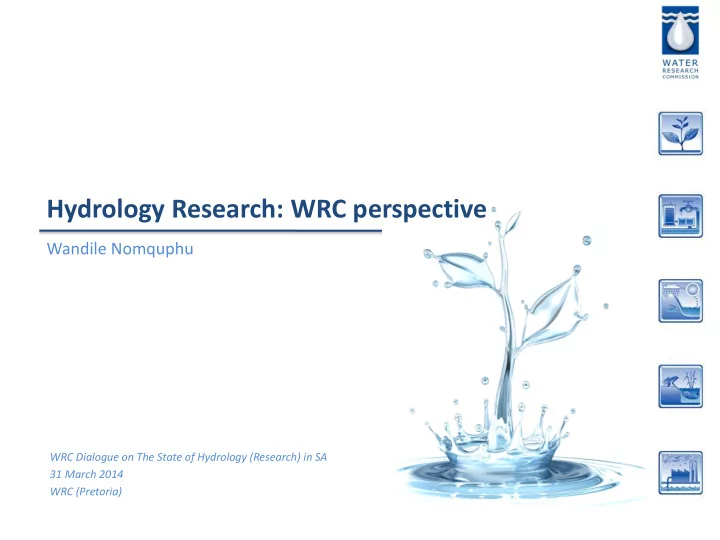

Hydrology Research: WRC perspective Wandile Nomquphu WRC Dialogue on The State of Hydrology (Research) in SA 31 March 2014 WRC (Pretoria)
Mandate of the WRC The mandate of the WRC (the Water Research Act, Act no 34 of 1971) highlights the following functions to be carried out by the organisation: Promoting co-ordination, co-operation and communication in the area of water research and development Establishing water research needs and priorities Stimulating and funding water research according to priority Promoting effective transfer of information and technology Enhancing knowledge and capacity building within the water sector
WRC Research Portfolio KSA 1: Water Resource Management - water resource institutional arrangements, water resource assessment and planning, water quality management, resource protection, water and climate change KSA 2: Water-linked Ecosystems – ecosystem services, monitoring and assessment of eco-health KSA 3: Water Use and Waste Management – water footprints, brine, AMD, water-energy nexus, emerging contaminants and trace organics, drinking water quality monitoring KSA 4: Water Utilisation in Agriculture - increasing productivity of rainwater and irrigation water use; uplifting rural economies with market directed food production; water footprint in food value chains; alternative sources of renewable energy; preventing water and soil degradation and pollution. 3
KSA1: Water Resource Management Thrust 1: Water Resource Institutional Arrangements Roles and responsibilities; tools and methodologies for IWRM institutional support Thrust 2: Water Resource Assessment and Planning Understanding hydrological cycle; promoting systematic assessment & planning Thrust 3: Water Quality Management More emphasis on ‘solution formulation’ than ‘problem formulation’; decision support for well-known water quality problems; surveillance of emerging issues Thrust 4: Water Resource Protection Understanding catchment processes and land use affecting quantity and quality Thrust 5: Water Resources and Climate Quantitative predictions; understanding vulnerability; development of adaptation strategies; understanding extreme events
Hydrology components (after BHS, 1990) Quantity Domain Quality Domain
Hydrology research WRC recognized hydrology as central to the : development, management and use of water management of flood and drought risks, and protection of aquatic environment Established Coordinating Committee for Research in the Hydrological Cycle (CCRHC) operated under DWA – 1977 initiate and coordinate all hydrological research in SA Support HCD through research centres at Universities (e.g. HRUs at Wits, Rhodes, Zululand, Natal, UOFS, etc) master research plans for surface water research – late 1970s groundwater research – 1981 effects of rural land use and catchment management on water resources - 1981 etc Today : CCRHC framework still loosely operated by WRC without much financial backing to establish research infrastructure at Universities
Key issues for hydrology in SA Hydrological research programme No clear and agreed hydrology research programme for the country No authority/centre to articulate hydrological issues, funding for hydrological research is limited (or not guaranteed) Long-term hydrological databases Lack of coordination in the development and maintenance of long-term national observations Research projects short-lived and data held in research institutes (or individuals) Lack of public access to hydrological data Need to maintain processed datasets (and hence maintain adequate data-gathering network) Future skills base in hydrology The current national capability in hydrology is unknown as there is no audit mechanism to measure the throughput of ‘real’ hydrologists with a solid foundation in science and engineering. The country has no long-term strategy for ensuring a constant supply of hydrology scientists, though the WRC, maintain some throughput of new students through its capacity building within projects.
Thank you
Recommend
More recommend